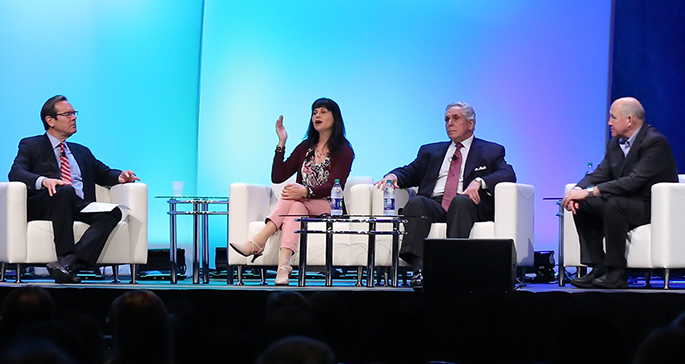
The future belongs to the adaptable, leaders from across the clinical trial spectrum told attendees of ACRP 2019 in Nashville today (April 13).
“Technology is coming, and we all need to embrace it,” said Virginia Nido, Global Head, Product Development Industry Collaborations, at Genentech, a member of the Roche Group. For example, a new generation of wearables is also creating “new job accountability” for clinical trial professionals, Nido said. Studies have shown that when there is a problem with a device, users want to go to their clinical trial contact for answers, not the product manufacturer. “There’s so much more for us to learn today,” Nido said.
“Half of what you know will be obsolete in 18 months,” WCG Executive Chairman and Chief Executive Officer Donald Deieso told the audience. Successful practitioners, he said, will be “excited” by the challenge and welcome it. “Embrace your next level of contribution,” he said.
Hype and headlines notwithstanding, don’t count on so-called virtual trials replacing all humans anytime soon, though. While they will definitely have their uses, virtual trials are very limited when patients are actually sick, said Andy Lee, senior vice president and head of global clinical trial operations at Merck. “There’s no do-it-at-home kit for biopsies,” he noted. Instead, the technology should free clinical research associate professionals up to use their time more efficiently. “You are one of the most critical components of clinical trials,” Lee told the ACRP audience.
“The people who are going to drive the change that needs to take place in this industry are sitting in this auditorium,” ACRP Executive Director Jim Kremidas said.
“I would put it this way,” said Deieso. “If not ACRP, then who? It’s that simple.”
“I see an audience here of highly skilled professionals, and experience isn’t something you can download off the Internet,” Lee said.
Lee said his shop is looking for “more adaptive” people to power its future workforce. He also called on the wider industry to do a better job of collaborating wherever possible. “We haven’t done a good of job sharing information in some areas,” he said. “There is no competition in operations.”
The clinical trial industry should also do a better job advertising the skillsets it needs and promoting the idea that “clinical research is a noble thing,” Lee said. “You should be very proud of what you’ve done,” he added.
Nido advocated the power of ongoing learning and curiosity. “Make sure you have foundational training,” Nido said, noting she had become ACRP-certified in recent months. “Then go for it and dig into that change,” she added. “Thank you for all of your hard work,” Nido said, “and if I were a patient in a clinical trial, I would want to see you.”
Author: Michael Causey


